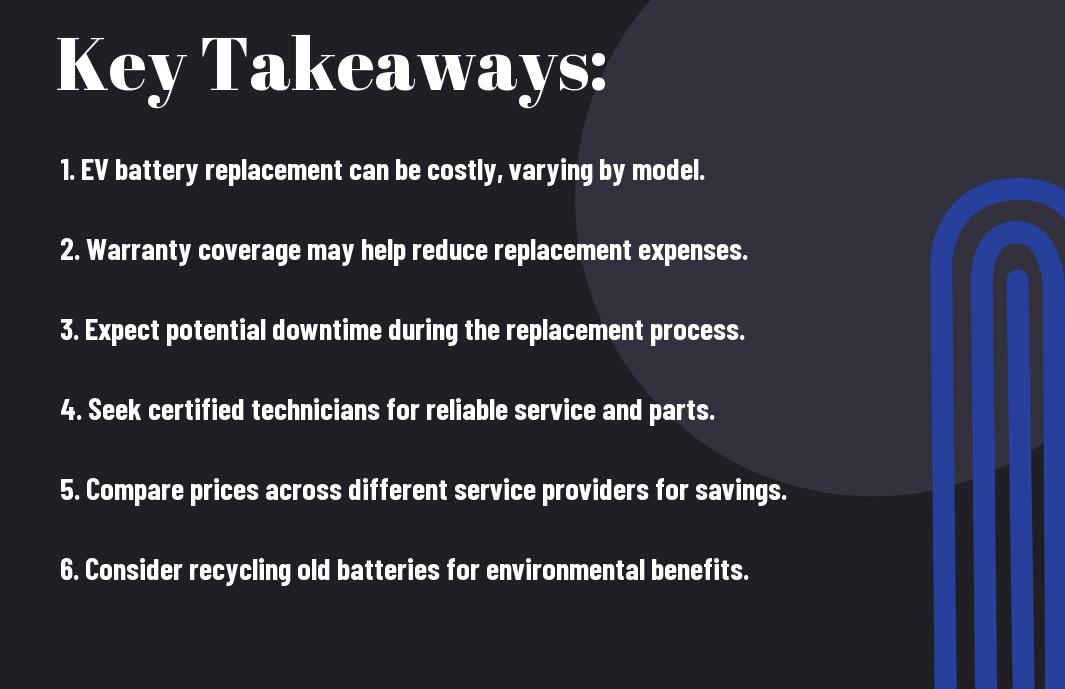Over time, electric vehicle (EV) owners may find themselves facing the reality of battery replacement, a significant component of EV maintenance. They often wonder about the costs associated with this process and what steps to anticipate. This article provides insights into the financial aspects of battery replacement, along with an overview of what individuals should expect during each stage of the procedure. By understanding these key factors, EV owners can make informed decisions and prepare for this inevitable aspect of owning an electric vehicle.


Understanding EV Batteries
While electric vehicle (EV) batteries are a pivotal component of sustainable transportation, their complexities can often be overlooked. Many buyers wonder about the implications of battery replacement on ownership costs. They might ask themselves, Do you take into account the cost of battery replacement when considering an electric vehicle purchase?
Types of EV Batteries
By examining the different types of EV batteries, individuals can better understand their choices in electric vehicles.
| Types | Description |
| Lithium-ion | The most common type, known for high energy density. |
| Nickel-Metal Hydride | Durable and reliable, often seen in hybrids. |
| Lead-Acid | Less common in modern EVs, used in some older models. |
| Solid-State | Emerging technology with potential for higher performance. |
| Ultra-Capacitors | Used for quick bursts of power but not for long-range. |
The various types of EV batteries significantly influence performance, longevity, and replacement considerations.
Lifespan and Performance
Beside understanding battery types, the lifespan and performance of EV batteries are key factors for any electric vehicle owner.
Understanding that battery lifespan usually ranges between 8 to 15 years is vital for prospective EV owners. Factors such as charging habits, environmental conditions, and battery technology advancements also play a role in performance. Maintenance practices and usage patterns significantly influence overall battery health, ensuring that they can meet driving expectations over time.
Cost Factors of Battery Replacement
Assuming that an individual is considering an electric vehicle (EV) battery replacement, there are several cost factors to take into account. These include:
- Battery type and model
- Age and condition of the vehicle
- Labor costs at the service center
- Warranty and incentives
After assessing these factors, they will have a clearer idea of the overall expense involved in replacing the EV battery.
Battery Type and Model
Behind every electric vehicle battery, there lies a range of types and models that significantly influence its replacement cost. Different manufacturers produce various battery configurations, affecting pricing and availability. High-capacity batteries typically incur higher costs due to advanced technology and materials used in their production.
Labor and Additional Costs
Costs related to labor and additional services can also impact the total expenses of battery replacement.
In addition to the price of the battery itself, individuals should consider labor charges, which can vary depending on the service center’s location and expertise. Additional expenses may arise from disposal fees for the old battery, testing fees for vehicle systems, and potential updates or repairs that may be required during the replacement process. Overall, a thorough evaluation of these costs will lead to a more accurate budget for the replacement.

The Replacement Process
Keep in mind that the EV battery replacement process can vary depending on the vehicle make and model. It’s vital for owners to understand what to anticipate, including the steps involved, time requirements, and costs associated. Being informed helps ensure a smoother experience throughout the procedure.
Step-by-Step Overview
Across the battery replacement process, he or she can expect the following steps:
| Diagnosis of the battery issue | Identifying necessary replacement parts |
| Disassembly of the vehicle components | Replacement of the old battery |
| Reassembly of the vehicle | Testing of the new battery functionality |
Timeframe for Replacement
By understanding the timeframe, owners can better prepare for their EV battery replacement. Generally, this process can take anywhere from a few hours to a couple of days, depending on the complexity of the vehicle and the availability of replacement parts.
Process complexity, parts procurement, and service provider workload can significantly affect the timeframe for EV battery replacement. For many vehicles, the initial diagnosis and battery removal might take several hours, followed by additional time for reassembly and testing. Owners should consult with the service provider to gain a more accurate estimate tailored to their specific situation.

Warranty and Insurance Considerations
For electric vehicle (EV) owners, understanding warranty and insurance considerations is crucial when it comes to battery replacement. Many manufacturers offer warranties that cover battery defects, which can significantly reduce costs for the owner. Additionally, insurance policies may include coverage for battery replacement under certain conditions, ensuring that the financial burden of unexpected repair costs is minimized.
Manufacturer Warranties
Warranty options vary by manufacturer, often covering the battery for an extended period, typically ranging from 8 to 10 years or up to a specific mileage. She should check her vehicle’s warranty for details on coverage against defects and capacity loss, as some warranties offer full or pro-rated replacements, providing peace of mind.
Insurance Coverage Options
Around EVs, insurance coverage may also play a significant role in battery replacement costs. Policies can differ widely, and it is advisable for owners to review their coverage options to ensure they have adequate protection.
Understanding the specifics of insurance coverage options is vital for EV owners. Many insurance providers offer varied levels of coverage that may include battery repair or replacement, especially if the vehicle is involved in an accident or sustains damage. They should explore comprehensive plans that specifically address battery costs, as this can safeguard against potential out-of-pocket expenses that arise from battery deterioration or malfunction.
Environmental Impact of Battery Replacement
To assess the environmental impact of EV battery replacement, one must consider both the manufacturing process and the end-of-life options for the batteries. The extraction of raw materials and energy consumption during production significantly contributes to environmental degradation. Furthermore, responsible disposal and recycling of batteries can mitigate negative effects, ensuring that valuable components are not wasted and that harmful materials are handled appropriately.
Recycling Options
Around the world, electric vehicle batteries are increasingly being recycled to recover valuable materials such as lithium, cobalt, and nickel. Specialized facilities employ techniques to safely dismantle and process used batteries, reducing the demand for new raw materials and minimizing the environmental footprint of battery production.
Sustainable Practices
Options for sustainable practices in battery replacement include sourcing materials responsibly and supporting recycling programs that prioritize eco-friendly methods. By implementing closed-loop systems, manufacturers can ensure that materials are reused continuously, which not only conserves resources but also significantly decreases waste that ends up in landfills.
Considering the environmental impact of battery production and disposal, sustainable practices play an crucial role in fostering a circular economy. By encouraging manufacturers to adopt eco-friendly initiatives, he or she can contribute to reducing carbon emissions and conserving natural resources. This commitment to sustainability can also drive innovation in battery technology, paving the way for more efficient and environmentally responsible energy solutions in the future.
Future Trends in Battery Technology
Many experts agree that the days of costly EV battery replacements are numbered. Innovations in battery chemistry and manufacturing processes are paving the way for more efficient, lower-cost options. For further insights, readers can explore The days of costly EV battery replacements are numbered.
Innovations Affecting Costs
About advancements in solid-state batteries and lithium-sulfur technology are expected to dramatically reduce costs associated with electric vehicle battery replacements. These developments promise higher energy densities and longer lifespans, making batteries more affordable and accessible for consumers.
Market Outlook
To understand the future of EV batteries, industry analysts believe market demand will continue to rise, leading to increased competition among manufacturers. As a result, this heightened competition is anticipated to drive down costs and improve battery efficiency.
Also, with the growing focus on sustainability, major automotive companies are investing in research to enhance recycling processes and reduce resource dependency. This strategy not only addresses cost concerns but also supports environmental objectives, indicating a promising future for both consumers and the planet.
Final Words
Hence, understanding the costs associated with EV battery replacement is vital for electric vehicle owners. They should be prepared for varying expenses based on the make and model of their vehicle, as well as the service provider they choose. Engaging in thorough research beforehand will help them anticipate these costs. She might also find valuable insights on Electric Car Battery Replacement Costs, ensuring a smoother experience during the replacement process. Ultimately, knowledge empowers them to make informed decisions.



